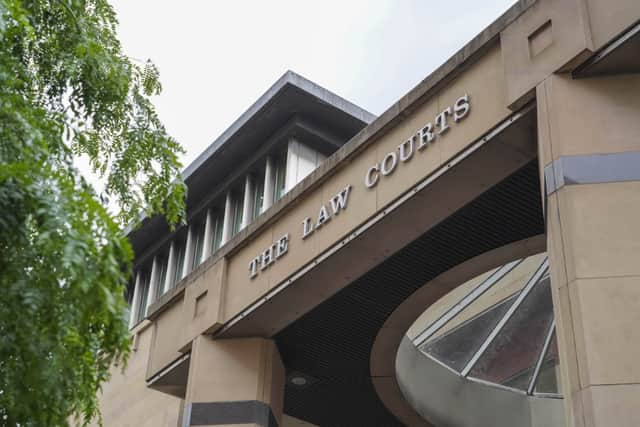Rotherham man suffering 'psychotic illness' subjected stranger to 'frightening' knife threat
and live on Freeview channel 276
A Rotherham man who threatened to attack a stranger with a knife while suffering from a ‘psychotic illness' has been told it is necessary for him to be detained in hospital for the ‘protection of the public’.
Mohammad Khoshroo, aged 31, subjected a man to the ‘frightening’ ordeal, during an incident at a South Yorkshire park on November 2, 2022.
Advertisement
Hide AdAdvertisement
Hide AdDuring a hearing held on January 22, 2024, Judge Michael Slater told Khoshroo: “This was a serious offence, involving, as it did, threatening to attack a complete stranger in a public park with a knife. Fortunately, he was able to evade your threat and no injury was suffered.


“All the same, it must have been an extremely frightening incident.”
Khoshroo, of Princes Street, Rotherham, was subsequently arrested and charged with the offence of threatening another with a bladed article.
He was convicted of the offence, after a jury returned a unanimous guilty verdict at the conclusion of a trial.
Advertisement
Hide AdAdvertisement
Hide AdGiving evidence to Sheffield Crown Court, Dr Kit Jacoby said Khoshroo had been under his care under an interim hospital order since August 2023, and he believed he met the diagnostic criteria for 'schizoaffective disorder' of the 'depressive type'. In a report that went before the court, Dr Jacoby said he believed Khoshroo was suffering from a 'psychotic illness' at the time of the incident.
Dr Jacoby said that, in his view, it was 'lucky' Khoshroo’s offending behaviour 'did not end catastrophically, and that the victim was able to dodge the blow'.
Writing in his report, Dr Jacoby also said Khoshroo had exhibited symptoms including: 'behavioural disturbances; disordered thought processes; paranoid beliefs; auditory hallucinations and impaired insight'. The symptoms 'have been present' since at least 2021, both while Khoshroo was in the community, and whilst he has been receiving treatment in hospital, Dr Jacoby added.
He told the court that he believed Khoshroo’s presentation suggests ‘an element of treatment resistance’.
Advertisement
Hide AdAdvertisement
Hide Ad“He [Khoshroo] has continued to express the view that he doesn’t want to take medication, or that he wants the medication to stop. As the court has heard today, he desires to move away to Scotland, Ireland or America. So I’m of the view he would stop taking medication if he wasn’t compelled to do so, if he wasn’t supervised. And I suspect he would relapse harshly,” Dr Jacoby said.
Dr Jacoby continued by saying that as Khoshroo’s offending appears to be ‘intimately linked’ to his mental illness, should he stop taking his medication and relapse, his risk to the public would ‘subsequently increase’.
The court was also told that Khoshroo has a history of ‘psychoactive substance misuse’.
In addition, the childhood trauma suffered by Khoshroo, which includes the witnessing of abuse, 'increased his vulnerability to mental health issues'.
Advertisement
Hide AdAdvertisement
Hide AdDr Jacoby said he recommended Khoshroo was sentenced to a hospital order, under Section 37 of the Mental Health Act 1983.
A section 37 hospital order means a defendant will be sent to hospital instead of prison, and in order for a defendant to be eligible for such an order they need to have been convicted of an offence which could lead to a prison sentence, and two doctors have given evidence that a defendant has given evidence that means you should be in hospital for treatment, and appropriate treatment is available. Khoshroo met the relevant criteria for such an order, the court heard.
Dr Jacoby also recommended that Khoshroo should also be sentenced to an accompanying restriction order, under Section 41 of the same act, which means the hospital order will remain in place until Khoshroo is discharged by a Mental Health Tribunal or his responsible clinician, who would be required to get permission from the Ministry of Justice.
The court was told that while Khoshroo does have previous convictions, they were committed between 2020 and 2022, with most 'confined to the magistrates’ court'.
Advertisement
Hide AdAdvertisement
Hide AdDefending, Christopher Brewin, said in light of Dr Jacoby’s testimony, which included responses to questions he posed, he could not oppose the recommendations for a hospital order and accompanying restriction order.
Judge Slater said that having considered all of the circumstances of the case, the most 'appropriate' sentence for the 'protection of the public' would be the recommended hospital order, and accompanying restriction order.
He said he was satisfied that Khoshroo was suffering from schizoaffective disorder, and that the disorder was of a 'nature or degree which makes it appropriate' for him to be detained in hospital for treatment.